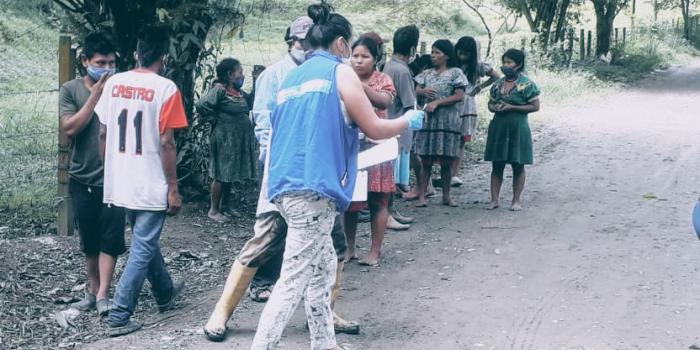
Unit serves the needs of the Embera people in Puerto Boyacá
Humanitarian, psychosocial care and nutritional kits are part of the aid and actions implemented for the Katío and Chamí communities

With the delivery of nutritional kits to the families that make up the settlements of Embera Chamí and Embera Katío people who have remained in the municipality of Puerto Boyacá (Boyacá) for more than 10 years, the Victims Unit strengthens the actions of attention, assistance and comprehensive reparation for indigenous peoples and communities led by the General Directorate through the Ethnic Affairs Directorate.
Precisely within the framework of the celebration of the Indigenous Peoples Week, the director of the Unit, Ramón Rodríguez, expressed the entity's commitment to humanitarian assistance processes “we have in our records more than 116.000 victims who are recognized and who do part of indigenous peoples; there we are doing a differential care process in everything that has to do with the psychosocial care component”.
In addition, the director highlighted that in 2019 the goal of having compensated 16 communities of 25 indigenous peoples with more than 41.000 victims located in the Amazon was achieved. “It is a historic project and that we have to continue advancing in the implementation of the plans for collective reparation”.
In Puerto Boyacá, the Unit, through the Central Territorial Directorate, has been providing preferential attention to the two Embera communities.
Updating of documents and inclusion of minors in the Unique Registry of Victims (RUV), attention sessions, delivery of humanitarian aid and recently the presence of an Embera professor was proposed to start with an education program based on ancestral culture and with the use of the indigenous luenga.
“With in this community we have total commitment to meet their needs and also comply with the implementation of the ethnic decree and be able to articulate with the different entities of the National System of Attention and Comprehensive Reparation to Victims SANARIV, the adequate offer to the needs according to their territorial reality and customs”, said the director of the Central Territorial Directorate María José Dangond.
(End/WPG/DFM)






